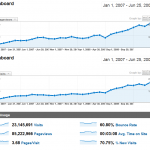Today marks 4 years since Motive Force LLC was officially founded. I’m proud of my baby growing up! There are various stats about survival-rates for nascent companies, there but in general they say that about 50% die off in the first year, pregnancy and then 50% of the remaining companies die each year after. If those stats are true, dosage that puts Motive Force at about the 94th percentile so far. Way-to-go, kiddo!
It’s been a blast running it all this time, and by any measure they’ve certainly been four of the most eventful years of my life.
Although it has released numerous sites and products, Motive Force’s most visible success so far has been LyricWiki. I felt this would be an appropriate time to share a graph of some of the traffic growth since I don’t often get a chance to do so – and we all like to show how our progeny have progressed!
Happy Birthday Motive Force!
* For the curious and/or mathematically inclined: an exponential trend-line has a slightly better R-squared value than a linear trend line for the current data (0.89 versus 0.86). This implies that it’s likely that the growth is exponential, but it isn’t quite enough data to be sure in my unprofessional opinion.


